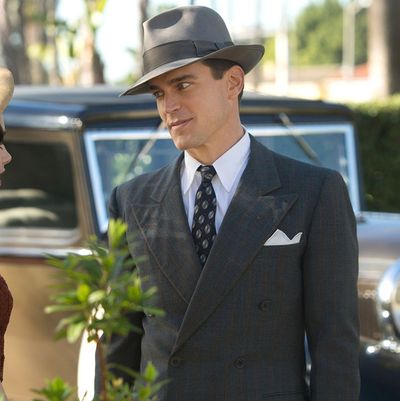
The first word that comes to mind when I think about The Last Tycoon is handsome.
That the costumes in this Amazon adaptation of F. Scott Fitzgerald’s final, unfinished novel are handsome is not a surprise, since they were designed by Mad Men veteran Janie Bryant with extra emphasis on tailored suits and milky-silky evening gowns. So is the production design that went into creating the stages and offices of Brady-American Pictures, the financially struggling ’30s-era Hollywood studio at the center of the series. And then there’s the lead of this ten-episode series, Matthew Bomer, who looks like the wildly successful result of an experiment designed to create the world’s most handsome man, an effort that presumably ended when a bunch of lab-coated scientists looked at each other, slack-jawed, and said, “My God. We actually did it!” (It’s not just Bomer, either. Many of the cast members — Lily Collins, Rosemarie DeWitt, Dominique McElligott of House of Cards, Mark O’Brien, Jennifer Beals — are also blessed with the kind of classic beauty that makes them naturals for a glamorous period piece like this.)
But handsome can’t carry a series on its own. While this hour-long drama about the politics and production troubles at a motion picture studio, led by Pat Brady (Kelsey Grammer, a blustery mogul with the potential to go full hurricane) and his protégé Monroe Stahr (Bomer), possesses an appealing surface allure, it’s ultimately too restrained and conventional to qualify as a must-see. As we know from watching Feud: Bette and Joan, Hail, Caesar!, or pretty much any film or TV project about the madness of show biz from a bygone era, Hollywood offices and production lots are magnets for massive egos, dysfunctional personalities, and the chaos that ensues when the two crash into each other. The Last Tycoon — produced, co-written, and co-directed by Billy Ray, who wrote and directed the excellent Shattered Glass, and handled screenplay duties on The Hunger Games and Captain Philips — aims to capture that same sort of combustible energy while simultaneously maintaining a sense of dignity, two goals that often work against each other. As persuasive and committed as this cast is, the show somehow remains emotionally impenetrable.
Advance press coverage of the series has often compared the series to Mad Men, and to a certain degree one can see why: It’s set in a past decade, serves up plenty of sexual affairs, centers around talented people who, on some level, are hiding their true identities, and, as previously noted, hits the jackpot in the exquisite costuming department. But what makes The Last Tycoon different from Mad Men is that Monroe, a New York Jew who ditched his real name, Milton Sternberg, isn’t an anti-hero in the same way that Don Draper is. The series presents him as a decent guy with a broken heart, both because of an actual heart defect and the loss he suffered after his wife, big-screen star Minna Davis, died in a fire. He has a keen eye for storytelling and, yes, he has his flaws and blind spots. But as the show tells us over and over, everybody loves Monroe, and Bomer infuses him with an easy confidence and charisma that makes that totally understandable. As written, though, the character lacks the kind of deeper layers needed to make him a truly compelling nucleus for the series.
The deeper and darker layer department is handled primarily by Grammer’s Pat who is, naturally, threatened by Monroe’s abilities and charm, and worried that he’ll get poached by studio rival Louis B. Mayer (Saul Rubinek). This is something The Last Tycoon does quite a bit: It mashes up imaginary Hollywood figures with ones from the real world, including Mayer, director Fritz Lang, Irving Thalberg, and Marlene Dietrich. While that approach makes a certain amount of sense — Fitzgerald’s novel was inspired by his own experiences in 1930s Hollywood — it also muddles our ability to get a handle on the boundaries of this particular reality, even though it sometimes makes for fun, wink-wink moments. (You feel a little rush when Mayer sends over a script for Monroe to read, and it turns out to be The Wizard of Oz.)
The Last Tycoon deserves credit for creating so many strong-willed women, including Rose Brady (DeWitt), Pat’s dissatisfied and spirited wife; Celia (Collins), their 19-year-old daughter who bails on college in order to produce, with Monroe’s blessing, a thriller that’s also a thinly veiled critique of the German government; Kathleen Moore (McElligott), a striking waitress whose Minna-esque Irish lilt convinces Monroe to fall in love with her and to make her his next big star; and Margo Taft (Beals), an actress who makes sure everyone knows she’s got full control over every director with whom she works. None of these women are passive and all of them are bursting with ambition, a fact that becomes even clearer as the nine episodes progress. (At least 75 percent of them are also at least a little bit in love with Monroe.) Yet, while they all face obstacles — Rose, in particular, has a real boulder in her path with Pat as her husband — it’s also a bit surprising that their male colleagues and partners tend to so readily treat them as equals.
Of course, that’s how things ought to be. But in the 1930s, I’m not sure it was always that simple. That’s another thing that doesn’t quite gel about The Last Tycoon. While most of the time, it seems to be aiming for semi-historically accurate realism, it’s also steeped in enough fantasy to make it hard to know how to engage with it, or even whether to trust it. Then again, maybe that’s the point. Hasn’t every dreamer who’s taken that stereotypical small-town bus to Hollywood felt the same way about that mixed-up, alluring town?


